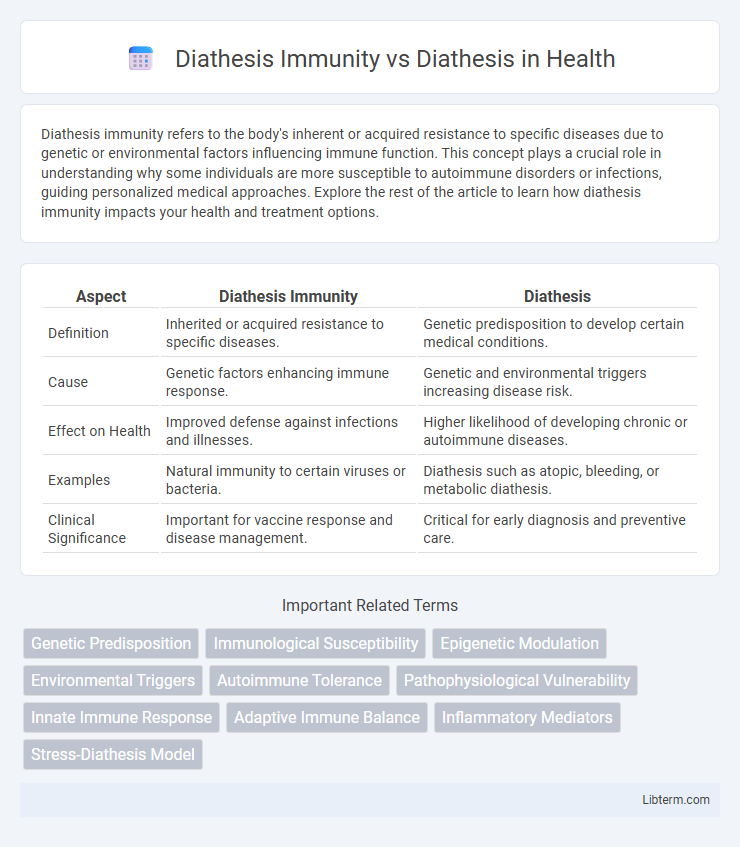Diathesis immunity refers to the body's inherent or acquired resistance to specific diseases due to genetic or environmental factors influencing immune function. This concept plays a crucial role in understanding why some individuals are more susceptible to autoimmune disorders or infections, guiding personalized medical approaches. Explore the rest of the article to learn how diathesis immunity impacts your health and treatment options.
Table of Comparison
| Aspect | Diathesis Immunity | Diathesis |
|---|---|---|
| Definition | Inherited or acquired resistance to specific diseases. | Genetic predisposition to develop certain medical conditions. |
| Cause | Genetic factors enhancing immune response. | Genetic and environmental triggers increasing disease risk. |
| Effect on Health | Improved defense against infections and illnesses. | Higher likelihood of developing chronic or autoimmune diseases. |
| Examples | Natural immunity to certain viruses or bacteria. | Diathesis such as atopic, bleeding, or metabolic diathesis. |
| Clinical Significance | Important for vaccine response and disease management. | Critical for early diagnosis and preventive care. |
Understanding Diathesis: Definition and Overview
Diathesis refers to an individual's inherent predisposition or vulnerability to develop certain diseases or disorders, often influenced by genetic, environmental, and physiological factors. Diathesis immunity, conversely, describes the resistance or reduced susceptibility to these conditions despite potential exposure to risk factors. Understanding diathesis involves recognizing how these innate susceptibilities contribute to disease manifestation and inform personalized medical approaches and preventive strategies.
Exploring the Concept of Immunity in Diathesis
Diathesis immunity refers to the body's inherent or acquired resistance to developing a particular diathesis, which represents a predisposition or susceptibility to certain diseases or disorders. This immunity can result from genetic factors, previous exposures, or immunological adaptations that mitigate the expression of a diathesis, thereby reducing the risk of manifestation. Understanding diathesis immunity offers crucial insights into personalized medicine by identifying protective mechanisms that prevent the onset of genetically or environmentally influenced health conditions.
Diathesis Types: Classification and Characteristics
Diathesis immunity refers to an individual's inherent resistance against certain diseases due to genetic or environmental factors, whereas diathesis encompasses a predisposition or vulnerability to specific health conditions. The classification of diathesis types includes hematologic diathesis, characterized by abnormal blood clotting and bleeding tendencies; allergic diathesis, marked by heightened hypersensitivity reactions like asthma or eczema; and metabolic diathesis, involving imbalances in metabolic processes leading to disorders such as diabetes. Each type of diathesis presents distinct pathophysiological mechanisms and clinical features, guiding targeted diagnostic and therapeutic approaches.
Diathesis Immunity: Mechanisms and Influences
Diathesis Immunity refers to the biological mechanisms that provide resistance against the development of disorders despite genetic or environmental predispositions, emphasizing immune system regulation and cellular defense pathways. Key factors influencing diathesis immunity include gene-environment interactions, epigenetic modifications, and immune tolerance processes that modulate inflammatory responses. Understanding these mechanisms aids in identifying protective biomarkers and potential therapeutic targets to prevent or mitigate disease onset in predisposed individuals.
Genetic vs Environmental Factors in Diathesis Development
Diathesis immunity involves genetic predispositions that enhance an individual's resistance to specific diseases, highlighting a strong hereditary component in immune system function. In contrast, diathesis development generally results from an interplay between genetic susceptibility and environmental factors such as stress, toxins, or infections, which trigger disease manifestation. Understanding the balance between inherited genetic factors and external environmental influences is crucial for predicting and managing diathesis-related conditions.
Comparing Diathesis Immunity with Traditional Diathesis
Diathesis Immunity differs from traditional diathesis by emphasizing the body's enhanced adaptive response to genetic and environmental stressors, rather than solely focusing on vulnerability to illness. Traditional diathesis models primarily address predispositions to psychological disorders based on inherited risk factors, while Diathesis Immunity integrates resilience mechanisms that mitigate negative outcomes. This comparison highlights Diathesis Immunity's role in promoting health through immune and neurobiological regulation, expanding the scope beyond mere susceptibility.
Risk Assessment: How Diathesis Influences Disease Susceptibility
Diathesis refers to a genetic or constitutional predisposition to developing certain diseases, significantly influencing an individual's risk assessment for illness susceptibility. Immunity, in contrast, involves the body's adaptive and innate mechanisms to resist disease, modulating this inherent risk based on environmental exposures and immune system efficacy. Understanding diathesis in conjunction with immunity provides a comprehensive framework for evaluating susceptibility and guiding personalized preventive strategies in clinical practice.
Preventive Strategies for Managing Diathesis and Diathesis Immunity
Preventive strategies for managing diathesis and diathesis immunity emphasize boosting the body's natural defenses through balanced nutrition, regular physical activity, and stress management techniques to reduce susceptibility to hereditary conditions. Tailored interventions such as immunotherapy and genetic counseling play a critical role in enhancing diathesis immunity by addressing specific vulnerabilities at the molecular level. Environmental control measures, including allergen avoidance and maintaining hygienic living conditions, further support prevention by minimizing triggers that exacerbate diathesis-related symptoms.
Recent Research Trends in Diathesis and Immune Response
Recent research trends emphasize the genetic and environmental interplay underpinning diathesis and immune response, highlighting how inherited vulnerabilities contribute to immune dysregulation in autoimmune and psychiatric disorders. Advances in epigenetics reveal that stress-induced molecular changes can activate latent diatheses, influencing immune system activation and inflammation pathways. Cutting-edge studies utilize multi-omics and neuroimmunology to decode the mechanisms by which diathesis predisposes individuals to differential immune responses, paving the way for personalized therapeutic strategies.
Clinical Implications and Future Directions in Diathesis Management
Diathesis immunity involves genetic or acquired resistance factors influencing disease susceptibility, affecting personalized treatment strategies and prognosis. Clinical implications emphasize early detection and tailored immunomodulatory therapies to improve patient outcomes in conditions like clotting disorders or immune deficiencies. Future directions include integrating genomic data and advanced biomarker profiling to refine risk assessment and develop targeted interventions for optimized diathesis management.
Diathesis Immunity Infographic

 libterm.com
libterm.com